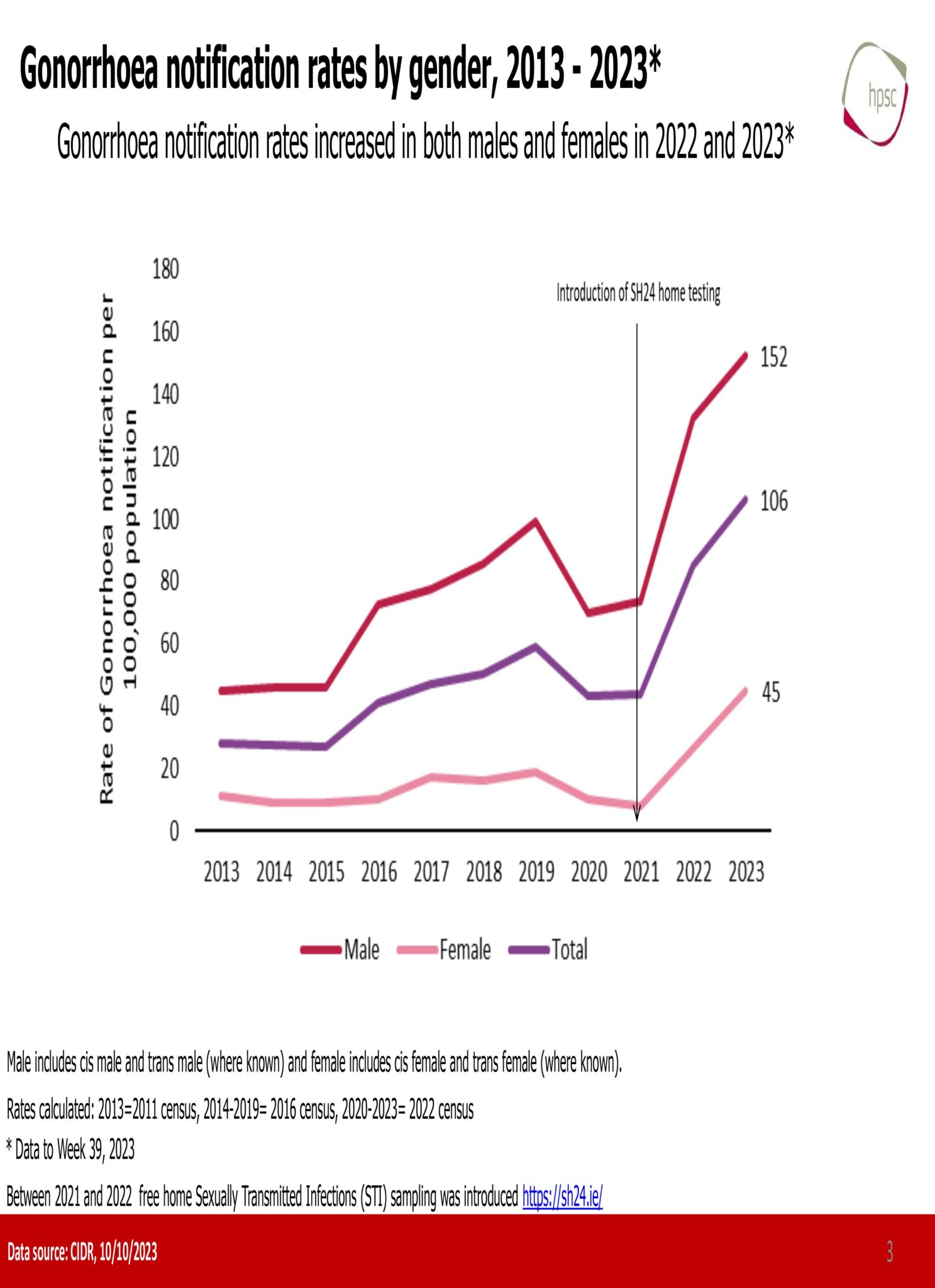- Lifestyle & Sports
- 29 Feb 24
Dr Aisling Loy on sexual health and Ireland's rise in STI notifications: "Never think that any problem is too small"

Dr Aisling Loy on the importance of young people remaining vigilant about their sexual health.
According to a recent HSE STI Surveillance report, Ireland saw a dramatic escalation in gonorrhoea notifications between 2019 and 2023. Young people have been particularly afflicted, with cases among females aged 20-24 years up 212%; and among males aged 15-19 up 88%.
Gonorrhoea infects the mucous membranes of the reproductive tract, including the cervix, uterus, and fallopian tubes in women, and the urethra in women and men.
By December 2023, in total there were 22,730 STI infections recorded by the HPSC — an increase of 29% on 2022’s numbers.
What’s behind these worrying statistics? According to Dr Aisling Loy – Consultant in Genito-Urinary medicine in St James’s Hospital and Himerus Health – what she sees as the younger generations’ skewed perceptions of sex have played a part.
“There’s hook-up culture,” she says, “having multiple partners and a constant availability of sex through dating apps, as well as the pornification of young people who’ve grown up with 24/7 access to porn. Their sexual repertoires are broader, with more expectations for performative sex. They’re expected to engage in oral or anal sex – often unaware that they’re at risk of transmitting STIs.”

In what is a far cry from our theocratic past, contraception and STD-preventing medicines are nowadays readily available. Is there a possibility that other aspects of safe sex have become underestimated as a result of these otherwise positive developments?
“A driver of increasing STI rates in the MSM (men having sex with men) community,” ,” says Dr Loy, “has been the introduction of pre-exposure prophylaxis, which prevents HIV. Many people have stopped using condoms – the fundamental cornerstone of sexual health – so we’re inevitably going to see a rise in STDs. There’s also a spill-over between the MSM and heterosexual communities, due to increased experimentation and fluidity these days.”
Rising screening rates have led to a small increase in reported cases, particularly with the availability of home test kits. Nonetheless, Dr Loy feels that Irish people are often reluctant to monitor their sexual wellbeing.
“There’s still a stigma,” she says. “People come in saying ‘I can’t believe I’m here. I’m so embarrassed’. It’s seen as something only ‘dirty’ people get done instead of a health check. I find people from Latin America, Western Europe and Scandinavia tend to be better testers. I’d have men in their thirties coming in sheepishly for a screen, saying ‘I started dating this girl from Brazil who wanted me to get a test, and she couldn’t believe I’d never had one’. If you’re having sex, you should be able to test. It’s no reflection on you other than you’re a sexually active person having a normal life.”
That said, a lack of awareness is perhaps the main underlying force behind the increasing transmission rates.
“People worry about pregnancy,” Dr. Loy observes, “but if they knew they could have a lifelong infection or cancer, then they would use condoms, so it’s more of a lack of education than irresponsibility. I don’t think they genuinely know the risk they’re putting themselves at. There’s little knowledge of how prevalent STDs are. When I speak to young people that have gotten STIs, it’s deeply traumatising for them. They get upset and say things like ‘he/she seemed fine, they looked clean’. There’s a misconception that someone with an STD has to be ‘dirty looking’."
You’ve probably had a run in with Dr. Google, searching your headache symptoms online only to discover that you’re suffering from a brain tumour (not). The Covid-19 pandemic also brought the anti-vax movement to the forefront of social media. How much, in Dr Loy’s eyes, does the internet contribute to disinformation surrounding sexual health?
“It’s hard to quantify,” she says, “because my patients generally don’t subscribe to that and if they did, they’ve quickly unsubscribed because they’re in front of a doctor. Some girls have parents who didn’t consent to their daughters getting the HPV vaccine back when it was launched in schools a few years ago. There was a carefully orchestrated anti-vax campaign on social media with a huge amount of misinformation.
“Girls missed out because their parents thought they were doing the right thing, and now some of them are stuck with an awful affliction of genital warts or cervical cancer. Imagine sitting beside your daughter going through chemotherapy because you didn’t sign a waiver. When people are left to their own devices, they go down rabbit holes reading absolute rubbish. There’s a lot of information on the internet, but not a lot of wisdom.”

Dr Aisling Loy
Education, increased willingness to test and above all else, wearing condoms, seem the obvious solutions to curbing the rise in STIs. What else should people do to keep their sexual health in check?
“Get vaccinated for things that can prevent infections,” informs Dr Loy. “For young people, that’s the HPV vaccination you’re offered in school, for those into group sex or riskier activities, vaccinate against hepatitis a hepatitis b and mpox. If you’re a gay man having unprotected sex consider going on PrEP.”
Being open with your significant other(s) is also vital.
“If you’re at the start of a new relationship and you want to throw away the condoms, chat with your partner and consider getting a screen together,” says Dr Loy. “A lot of people don’t bring it up. If you’re able to get naked together and have sex, you should be able to talk about sexual health.”
Instead of scouring the internet and sitting at home in a tizzy, the best thing to do is seek legitimate medical help.
“Nothing replaces the empathy and knowledge of an actual healthcare professional,” she explains. “Sexual health causes huge amounts of anxiety in young people. They don’t know where to turn, but when they come in, you can see the weight of the world lift from their shoulders. They realise they’re not alone, and that they had so many misconceptions.
“We need to get the message out that healthcare professionals hear everything - nothing will shock us,” she continues. “Never think any problem is too small and know that you can come in and chat about it.”
RELATED

- Lifestyle & Sports
- 19 Dec 25
Tullamore D.E.W. Distillery: Gift an experience that engages every sense

- Lifestyle & Sports
- 15 Dec 25
Bohemian FC and KNEECAP team up for new jersey fundraising for ACLAÍ Palestine
RELATED

- Competitions
- 12 Dec 25
WIN: Lunch For Two From Forge Wood Fired Pizza

- Lifestyle & Sports
- 12 Dec 25
Minding Creative Minds to hold December meet and greet

- Lifestyle & Sports
- 10 Dec 25
Ticketmaster Gift Card: Give The Gift Of Live

- Lifestyle & Sports
- 09 Dec 25
Swimmer Max McCusker joins the controversial Enhanced Games

- Lifestyle & Sports
- 05 Dec 25



